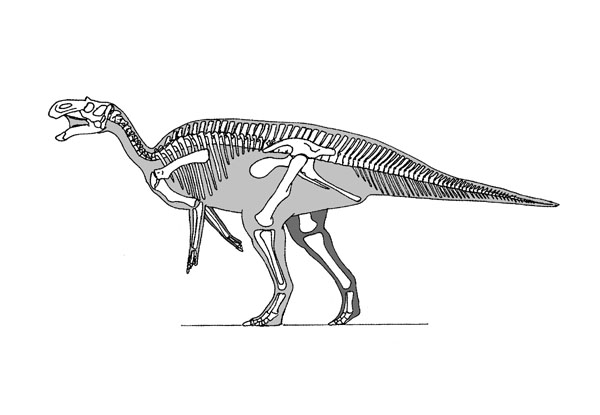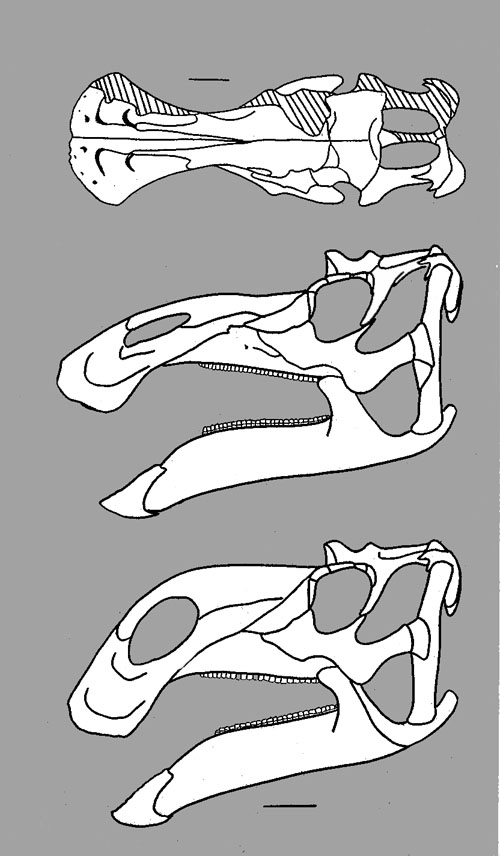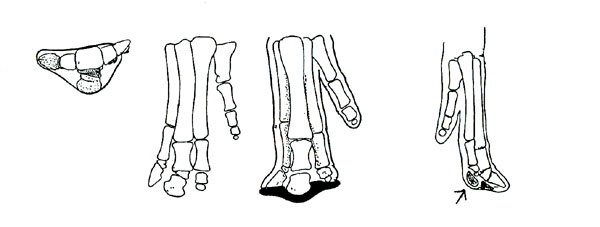
Species: peeblesorum HORNER & MAKELA, 1979
Etymology: In honor of the James and John Peebles families, owners of the land
where the specimens were collected.
Holotype: YPM 22405
Locality: 12 miles west of Choteau, on the James and John Peebles Ranch, Willow Creek Anticline, Teton County, Montana.
Horizon: Two Medicine Formation.
Note: Equivalent to the Lower to Middle Dinosaur Park Formation
Biostratigraphy:
Age: Judithian age, Campanian Stage, Senonian subepoch, Upper Gulf epoch, Late Cretaceous.
Material: Skull with partial right dentary and predentary.



Top two After Horner; Bottom after a ROM specimen.
Referred material:
YPM 22400: skeletons of 15 individuals, of babes, juveniles and adults.
Numerous eggs, eggshells, and nests.
Referred material:
HORNER, 1988
Material:
Lower Maiasaura nesting Ground.
Maiasaura bonebed.
Upper Maiasaura nesting Ground.
HORNER, 1999
MOR 244: Embryonic remains, Mid-shaft of a femur, proximal end of a tibia, 2 caudal vertebrae, partial dentary battery, partial parietal, cervical centrum, dorsal centrum, caudal centrum, partial humerus, distal metatarsal III, distal tibia, and partial right scapula.
MOR 281: 16 eggs in a nest.
Note: Incorrectly listed as MOR 328 by HIRSCH & QUINN, 1990.HORNER, 1992
MOR 005, MOR 547:
HORNER, 1994
MOR 236: Partial skeleton.
HORNER, RICQLES & PADIAN, 2000
YPM 33472: Early juvenile.
MOR 005JV: Late Juvenile.
MOR 0055A: Subadult.
MOR 005A: Adult.
HORNER & WEISHAMPEL, 1988
PU 22432: Embryonic remains in an egg.
PRIETO-MARQUEZ & GUENTHER, 2018
YPM-PU 22400: 6 left and 8 right maxillae (as well as 3 maxillary fragments), 2 partial left quadrates, 2 right jugals, 12 left and 12 right dentaries (as well as dentary fragments), a partial left sternal plate, a right coracoid, partial left and right scapulae, 6 left and 6 right humeri, 2 right and 2 left ulnae, 2 right and 1 left radii, left manus, right manual digits II, III and IV, a nearly complete right ilium missing the postacetabular process, the central plate of a right ilium, the preacetabular processes of a left and right ilia, 1 right and 2 left proximal ischiadic fragments, a left pubis, 24 femora, 16 tibiae, a partial left and 3 right fibulae, a left and right astragalus, a left calcaneum, a right metatarsal II, 2 left and 1 right metatarsal III, a right metatarsal IV, an articulated left and right pes, a pedal phalanx III-1 and various other indeterminate postcranial fragments.
STEIN, 2001
Pathological neural spine (a neural arch with 3 spines).
GATES, HORNER, HANA & NELSON, 2011
TCMI 2001.89.2
McFEETERS, EVANS & MADDIN, 2021
Locality: Linster Quarry, Teton County, Montana.
Horizon: Two Medicine Formation.
Note: Equivalent to the Lower to Middle Dinosaur Park FormationBiostratigraphy:
Age: Judithian age, Campanian Stage, Senonian subepoch, Upper Gulf epoch, Late Cretaceous.
Material:
ROM 66180: Large skull roof and braincase including articulated nasals and prefontals.
ROM 66181: Intermediate-sized posterior skull roof and dorsolateral portion of the braincase, lacking the basisphenoid and basioccipital.
ROM 66182: Relatively small skull roof and braincase including articulated prefrontals, disarticulated partial nasals, lacrimal and palatine.
ROM 60260: Large, heavily fractured posterior skull roof and braincase.
ROM 60261: Intermediate-sized right half of posterior skull roof and both sides of neurocranium.
TREXLER, 1994
Locality: Montana.
Horizon: Two Medicine Formation.
Note: Equivalent to the Lower to Middle Dinosaur Park FormationBiostratigraphy:
Age: Judithian age, Campanian Stage, Senonian subepoch, Upper Gulf epoch, Late Cretaceous.
Material:
ROM 44770: An adult skull and skeleton.
Note: This specimen shows its more closely related to Brachylophosaurus.
Note: With skin impressions (BELL, 2014).